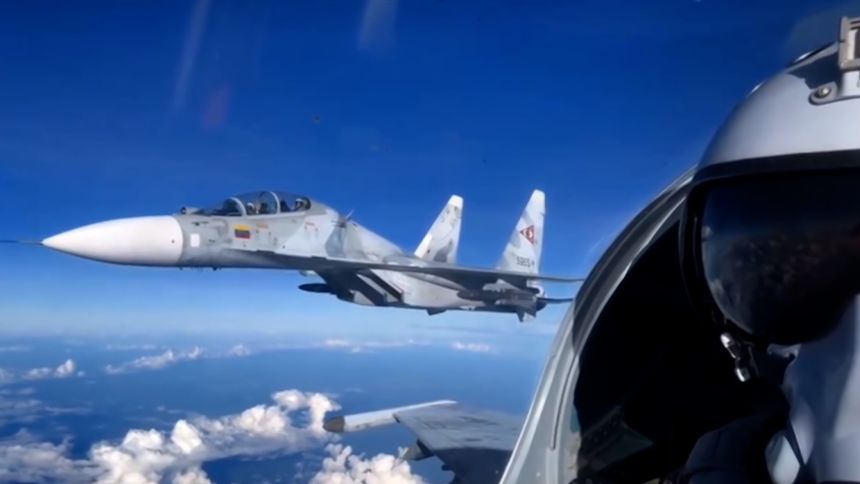Venezuela, on edge due to a U.S. military presence off its coast sparking invasion concerns, will conduct disaster preparedness exercises on Saturday as President Nicolas Maduro considers declaring emergency powers.
On Thursday, Maduro announced the drills, shortly after multiple earthquakes heightened tensions among a population already shaken by lethal U.S. strikes on suspected Venezuelan drug boats.
U.S. President Donald Trump has sent eight warships and a nuclear-powered submarine to the southern Caribbean, citing efforts to curb drug trafficking.
In recent weeks, U.S. forces have sunk at least three suspected drug boats in the Caribbean, resulting in over a dozen deaths, actions condemned by UN experts as “extrajudicial executions.”
Now, US military officials are drawing up options to target drug traffickers inside Venezuela’s borders, according to a report by NBC citing four sources familiar with the discussions.
The strikes could happen “in the next several weeks,” although Trump has not yet approved them, the report said.
Maduro, whom Trump accuses of leading a narco cartel, suspects Washington of pursuing regime change.
Thousands of Venezuelans have joined a civilian militia in response to Maduro’s call for bolstering the cash-strapped country’s defenses. Many have taken part in weapons training held at military barracks and in neighborhoods.
Maduro referred to US “threats” as he called for a drill starting at 9:00 am on Saturday to test “the people’s readiness for natural catastrophes or any armed conflict.”
Schools and hospitals are to take part “to prepare for any circumstance,” the president said.
On Tuesday, he appeared on state television with a red folder on which was written: “Decree declaring a state of external commotion across the national territory.”
Venezuela’s constitution allows for such a decree in the event of an “external conflict that seriously endangers the security of the nation, its citizens, or its institutions.”
It grants the government emergency powers to bypass parliament, suspend constitutional guarantees and deploy the military, among other measures. Maduro has not promulgated anything yet, but said that “we are preparing significant decrees… for any scenario that may arise.”
Earlier, Venezuela had deployed its Russian-origin Su-30 Mk2 fighter jets armed with anti-ship Kh-31 missiles in response to the US Navy actions.

Dubbed “Sovereign Caribbean 200,” the drills commenced on September 18 at the island of La Orchila. Venezuelan Defense Minister Vladimir Padrino said on national TV that the exercises were a response to the US warships deployment.
The US launched a massive military buildup in the South Caribbean as part of what it calls a war against drug cartels originating from Venezuela. This includes three Arleigh Burke-class destroyers, the cruiser Lake Erie, amphibious assault ship USS Iwo Jima, and an unnamed nuclear-powered submarine. Additionally, it also deployed the F-35B stealth fighters and MQ-9 Reaper drones to Puerto Rico.
Trump administration has accused Venezuela-backed drug cartels of funnelling drugs into the US, describing President Nicholas Maduro as “one of the world’s largest drug traffickers, the head of the Cartel of the Suns, and a threat to US national security.”
Meanwhile, the Venezuelan government, led by Nicolas Maduro, has vowed to defend itself against what it calls an unjust US military aggression.
Notably, the drills were launched following US President Donald Trump’s announcement of the second US strike on a boat in international waters near Venezuela on September 16.
Trump said the US military has destroyed an alleged Venezuelan drug vessel travelling in international waters on the way to the US, killing three people. No evidence was provided to support claims that the vessel was carrying drugs.
Venezuela Seeks Support Against US Threats
Venezuela called for solidarity at the United Nations on Friday against the “threat” of the United States, which has carried out deadly strikes against alleged drug-trafficking boats.
“As they can’t accuse Venezuela of having weapons of mass destruction or nuclear weapons, they’re making up vulgar and perverse lies that no one believes, neither in the United States nor around the world, to justify an atrocious, extravagant and immoral multi-billion-dollar military threat,” Venezuelan Foreign Minister Yvan Gil Pinto said in an address to the General Assembly.
“We would like to thank the governments and peoples of the world, including from the United States, for denouncing this attempt to wage war,” he said.
The United States has refused an appeal for dialogue by President Nicolas Maduro, a firebrand leftist not recognized by the United States after wide allegations of irregularities in his last election.
Maduro and his late predecessor, Hugo Chavez, had once been regular presences at the annual week of leaders’ meetings at the United Nations.
Maduro did not come this year, with Secretary of State Marco Rubio describing him as a fugitive from justice over a US indictment on drug-trafficking allegations.
With AFP Inputs




